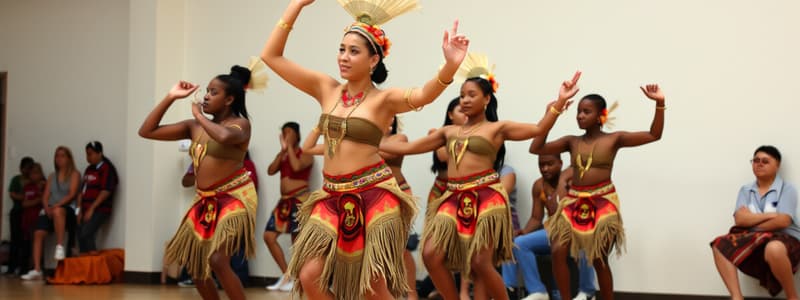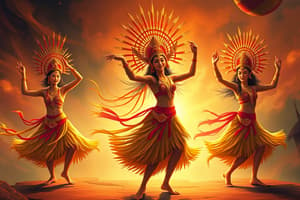Podcast
Questions and Answers
What aspect of space movement refers to the width and extent of actions?
What aspect of space movement refers to the width and extent of actions?
- Direction
- Level
- Size (correct)
- Power
Which type of movement is characterized by trembling and shaking?
Which type of movement is characterized by trembling and shaking?
- Swinging
- Suspended
- Collapsing
- Vibratory (correct)
Which of the following describes movements that travel either forwards or backwards?
Which of the following describes movements that travel either forwards or backwards?
- Direction (correct)
- Power
- Size
- Level
What term describes movements executed at either a low or high position?
What term describes movements executed at either a low or high position?
Which component of fitness is associated with the range of motion in joints?
Which component of fitness is associated with the range of motion in joints?
Which health-related fitness component encompasses both fat and nonfat elements of the body?
Which health-related fitness component encompasses both fat and nonfat elements of the body?
In the context of muscular exertion, what defines power?
In the context of muscular exertion, what defines power?
Which stretching technique is recommended after a workout to enhance flexibility?
Which stretching technique is recommended after a workout to enhance flexibility?
What was the primary form of dance expression in Ancient Egypt?
What was the primary form of dance expression in Ancient Egypt?
How was dance affected by the development of the Catholic Church?
How was dance affected by the development of the Catholic Church?
Which of the following best describes the Renaissance Era's influence on dance?
Which of the following best describes the Renaissance Era's influence on dance?
Which civilization integrated dance into military education?
Which civilization integrated dance into military education?
What was a key feature of dance during the Renaissance Era?
What was a key feature of dance during the Renaissance Era?
What philosophical view did ancient Greek philosophers hold regarding dance?
What philosophical view did ancient Greek philosophers hold regarding dance?
In what way did Ancient Rome regard dancing?
In what way did Ancient Rome regard dancing?
Which benefit of dance is NOT typically associated with its traditional role?
Which benefit of dance is NOT typically associated with its traditional role?
What was the primary reason dance was condemned by the Church during the Early Christian Era?
What was the primary reason dance was condemned by the Church during the Early Christian Era?
Which of the following elements of dance is NOT considered a primary element according to Loring and Pentz?
Which of the following elements of dance is NOT considered a primary element according to Loring and Pentz?
What significant development regarding dance and its health benefits occurred in the 1950s?
What significant development regarding dance and its health benefits occurred in the 1950s?
Which characteristic best describes 'sustained' dance energy?
Which characteristic best describes 'sustained' dance energy?
What is meant by the term 'timing' in dance?
What is meant by the term 'timing' in dance?
Which statement about physical activity programs is true?
Which statement about physical activity programs is true?
What effect does varying dance energies have on a performance?
What effect does varying dance energies have on a performance?
How can focus be altered by performers during a dance?
How can focus be altered by performers during a dance?
What does the term 'reversibility' refer to in fitness?
What does the term 'reversibility' refer to in fitness?
Which principle is essential for avoiding injuries during physical activity?
Which principle is essential for avoiding injuries during physical activity?
What is the primary purpose of incorporating variety into an exercise routine?
What is the primary purpose of incorporating variety into an exercise routine?
What should be prioritized to minimize the risk of heat-related issues while exercising outdoors?
What should be prioritized to minimize the risk of heat-related issues while exercising outdoors?
Which of the following best describes the 'intensity' component of exercise?
Which of the following best describes the 'intensity' component of exercise?
What does Body Mass Index (BMI) primarily measure?
What does Body Mass Index (BMI) primarily measure?
Which test is commonly used to assess flexibility?
Which test is commonly used to assess flexibility?
What does cardiorespiratory endurance measure?
What does cardiorespiratory endurance measure?
Which of the following is NOT a component of muscular fitness?
Which of the following is NOT a component of muscular fitness?
What is the principle of overload in exercise training?
What is the principle of overload in exercise training?
Which of the following best describes the progression principle in exercise training?
Which of the following best describes the progression principle in exercise training?
What does the 'FITT' principle stand for?
What does the 'FITT' principle stand for?
What is a sign that exercising is causing appropriate strain without crossing into pain?
What is a sign that exercising is causing appropriate strain without crossing into pain?
Study Notes
Dance and Its Historical Context
- Dance is a form of body movement expressing unity and strength, encompassing varied movements like jumping, turning, and extending limbs.
- In Ancient Egypt, dance was depicted in wall paintings and hieroglyphs, evolving to be intertwined with worship through the Catholic Church.
- The Renaissance Era saw a decline of religious domination in artistic expressions, allowing the rise of court dances and ballet in Italy and France.
Ancient Civilizations and Dance
- Greece highly valued dance, integrating it with military education and civic life, influencing modern dance forms.
- Roman Empire paid less attention to dance as wealth grew, leading to performances by slaves and captives.
- Early Christian Era marked the condemnation of dance due to its association with corruption, although its healing properties were recognized later.
Elements of Dance
- The primary elements of dance include space, timing, dance energies, and bodily shape.
- Space includes direction, size, and level of movements: movements can travel in various directions (forward, backward) and vary in size (large or small) and level (high, medium, low).
- Timing involves executing movements at different tempos, moving with the underlying beat and can vary in speed.
Benefits of Dance
- Historically viewed as a performing art, it took until the 1950s for research to confirm the health benefits of dance.
- Dance promotes physical activity, therapeutic experiences, and communication, reinforcing body and mind wellness.
Assessing Physical Activity and Fitness Levels
- Body composition measures the ratio of fat and nonfat components of body weight; common metrics include Body Mass Index (BMI) and Waist Circumference.
- Cardiorespiratory endurance refers to the body's ability to perform activities involving large muscle groups at moderate to high intensity over extended periods.
- Muscular fitness comprises strength (force production by skeletal muscles) and endurance (muscles' ability to perform repeated contractions).
Exercise Safety and Training Principles
- Principles of training include overload (stress needed for improvement), progression (systematic adjustment of training), reversibility (loss of fitness due to inactivity), and variety (maintaining motivation through diverse activities).
- Overload can be induced gradually to avoid injury, while progression should follow the FITT principle (Frequency, Intensity, Time, Type).
- Recovery intervals are necessary to allow the body to adapt and prevent injuries during the training process.
Health Guidelines and Recommendations
- The Philippine National Guidelines on Physical Activity advocate for simple strategies to adopt a physically active lifestyle.
- Safety in exercise involves listening to one’s body, avoiding overexertion, and ensuring a proper workout environment to minimize injuries.
Studying That Suits You
Use AI to generate personalized quizzes and flashcards to suit your learning preferences.
Description
This quiz focuses on the concepts of dance as an art form, emphasizing body movement as a means of expression and communication. Students will explore various aspects of tribal dance, including its role in culture, therapeutic benefits, and methods of coaching. Prepare to reinforce your understanding of the physical education curriculum.




